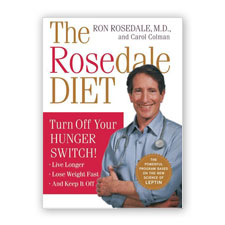The Rosedale Diet

The Rosedale Diet reaches to the heart of good health by controlling leptin, the hormone which tells the brain when to eat, how much to eat and when to stop.
Ironically, leptin is produced by fat cells. The goal is to keep leptin levels low enough to inform the body that you have eaten enough food. The body is then alerted to burn this fat. Lowering your level of leptin is as easy as following a diet high in good fats and low in starch and sugar.
Along with weight loss, patients abiding by the principles of the Rosedale Diet also reported favorable results in treating diseases such as diabetes, heart disease, hypertension, arthritis and osteoporosis.
A balance of lean protein, fiber-rich carbs and good fats, the 21-day plan avoids promoting too much protein or too many carbs. Foods are divided into an “A” list (the best possible choices of food), “B” list (foods to be eaten in moderation) and a “C” list (foods to avoid). Initially, you will eat from the “A” list made up of crab, olives, avocados, nuts, lobster, fish, shrimp, goat cheese, Cornish game hen, venison and other health-promoting foods. You’ll add foods from the “B” list gradually: steak, lamb chops, fruits, beans and more. The off-limit foods from the “C” list include milk, full-fat hard cheeses, hot dogs, fried foods, corn, commercially processed oils and other foods promoting obesity.
